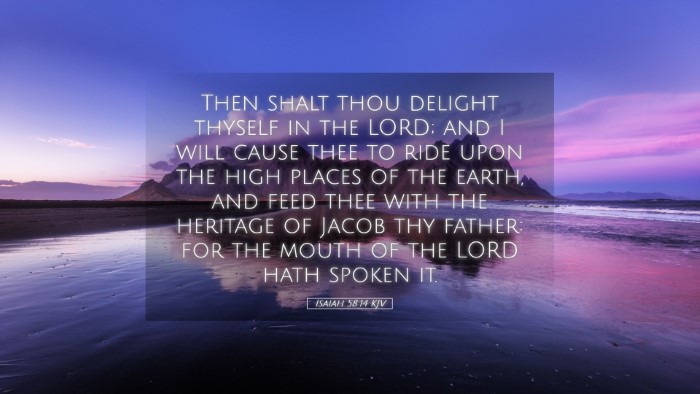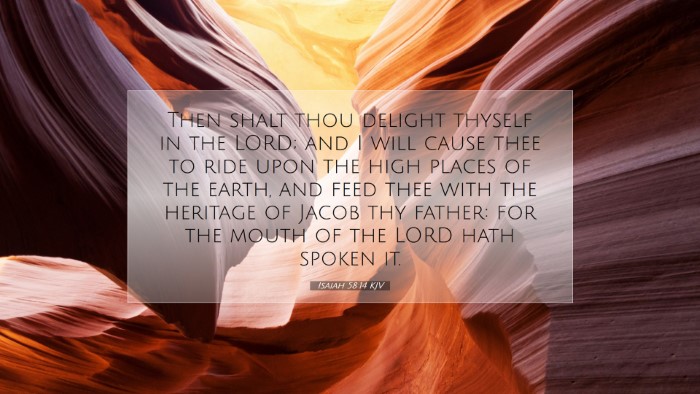Commentary on Isaiah 58:14
Verse: "Then shalt thou delight thyself in the Lord; and I will cause thee to ride upon the high places of the earth, and feed thee with the heritage of Jacob thy father: for the mouth of the Lord hath spoken it."
Introduction
This verse concludes a section of Isaiah that addresses true fasting and authentic worship. It emphasizes God's promise to those who genuinely serve Him, implying that spiritual devotion leads to divine reward. The insights drawn from public domain commentaries will examine the theological implications, historical context, and practical applications of this verse.
Theological Implications
Isaiah 58:14 presents a profound theological promise: the reward of delighting oneself in the Lord comes with both spiritual and material blessings. This aligns with the broader biblical principle that faithfulness to God leads to His providence and protection.
-
Delight in the Lord:
According to Matthew Henry, the phrase "delight thyself in the Lord" suggests an intimate relationship with God, wherein joyful communion transcends mere obligation. This delight stems from obedience and serves as a deep spiritual fulfillment.
-
Divine Promotion:
Albert Barnes notes that the phrase "ride upon the high places of the earth" indicates a position of honor and service. This metaphor reflects the notion that God elevates those who are faithful to Him, granting them authority and influence.
-
Heritage of Jacob:
Adam Clarke interprets "the heritage of Jacob" as the blessings promised to God's people. This reflects a covenantal relationship, indicating that the true heirs of God's promises are those who seek Him earnestly.
Historical Context
The context of Isaiah 58 is crucial for understanding this promise. During a time of national moral decline and empty religious practices, God calls His people back to true worship—one characterized by charity, justice, and sincere devotion.
-
Israel's Condition:
The historical setting reveals a society engrossed in ritualistic fasting, yet devoid of compassion and care for the needy. Through Isaiah, God rebukes these practices, illustrating that true worship entails righteous living and caring for others.
-
Call to Action:
This chapter illustrates God's demand for social justice as a prerequisite for blessings. The promise of delighting in the Lord and enjoying the heritage of Jacob emphasizes the connection between ethical behavior and divine favor.
Practical Applications
Isaiah 58:14 provides meaningful insights for contemporary believers. Pastors, students, theologians, and scholars can draw several practical applications from this verse.
-
Encouragement to Seek God:
In any spiritual journey, the pursuit of delight in the Lord is paramount. It invites believers into deeper communion with God, where joys stem from His presence rather than material conditions.
-
Calling for Social Responsibility:
As highlighted in this chapter, spiritual practices must not overshadow the need for social justice. Understanding that our worship is meaningful only when accompanied by acts of kindness paves the way for holistic faith expressions.
-
Understanding Divine Promises:
This verse reassures believers of God’s faithfulness. The promise of enjoying the “high places” of the earth reminds us that God cares for our well-being, both spiritually and materially, affirming His providence in our lives.
Conclusion
Isaiah 58:14 reminds believers of the reciprocal nature of their relationship with God. By delighting in Him and genuinely seeking His face in worship and service, they can expect to experience His blessings. The insights from Matthew Henry, Albert Barnes, and Adam Clarke reinforce this theological understanding, urging readers to embrace both the spiritual and practical dimensions of their faith.


